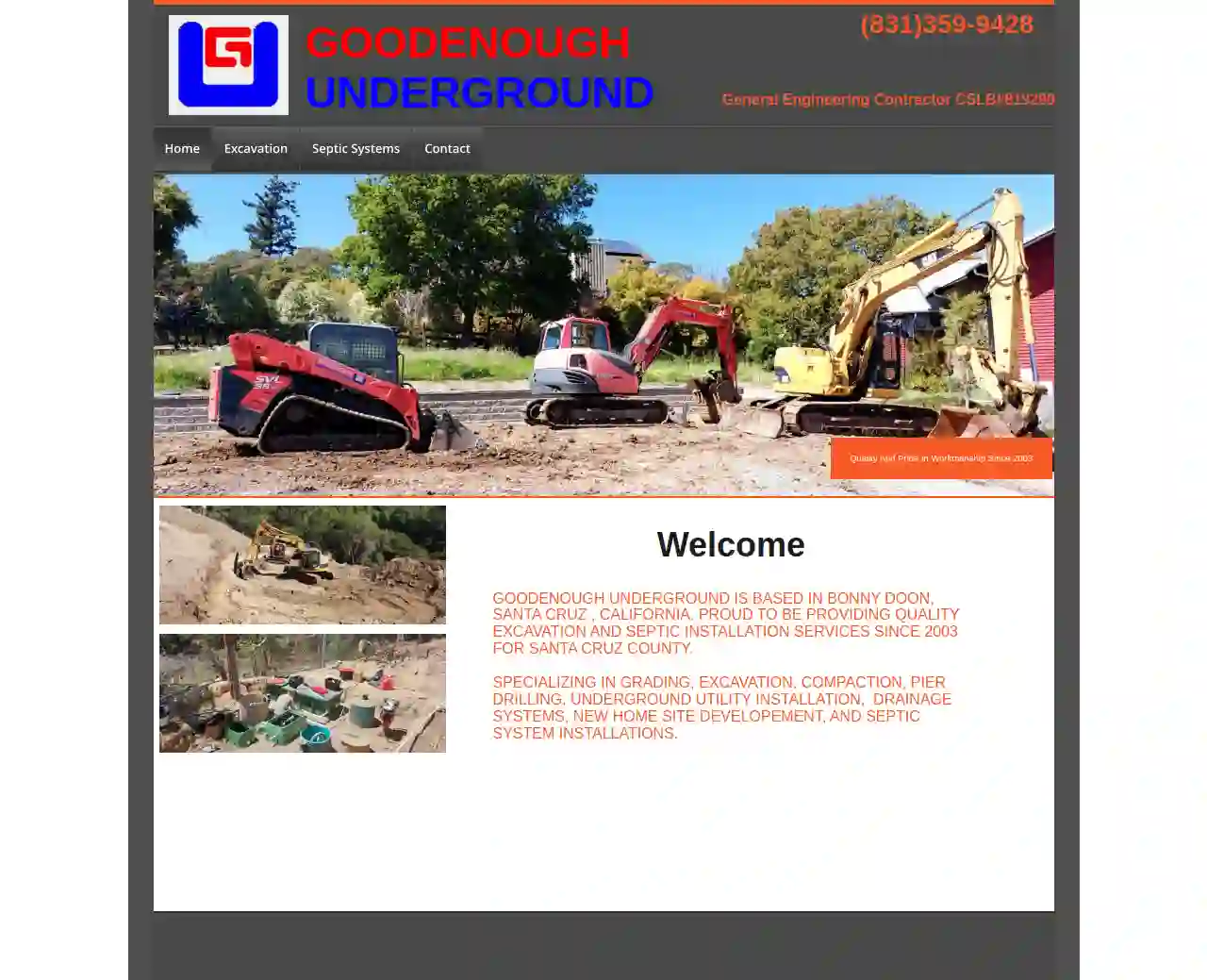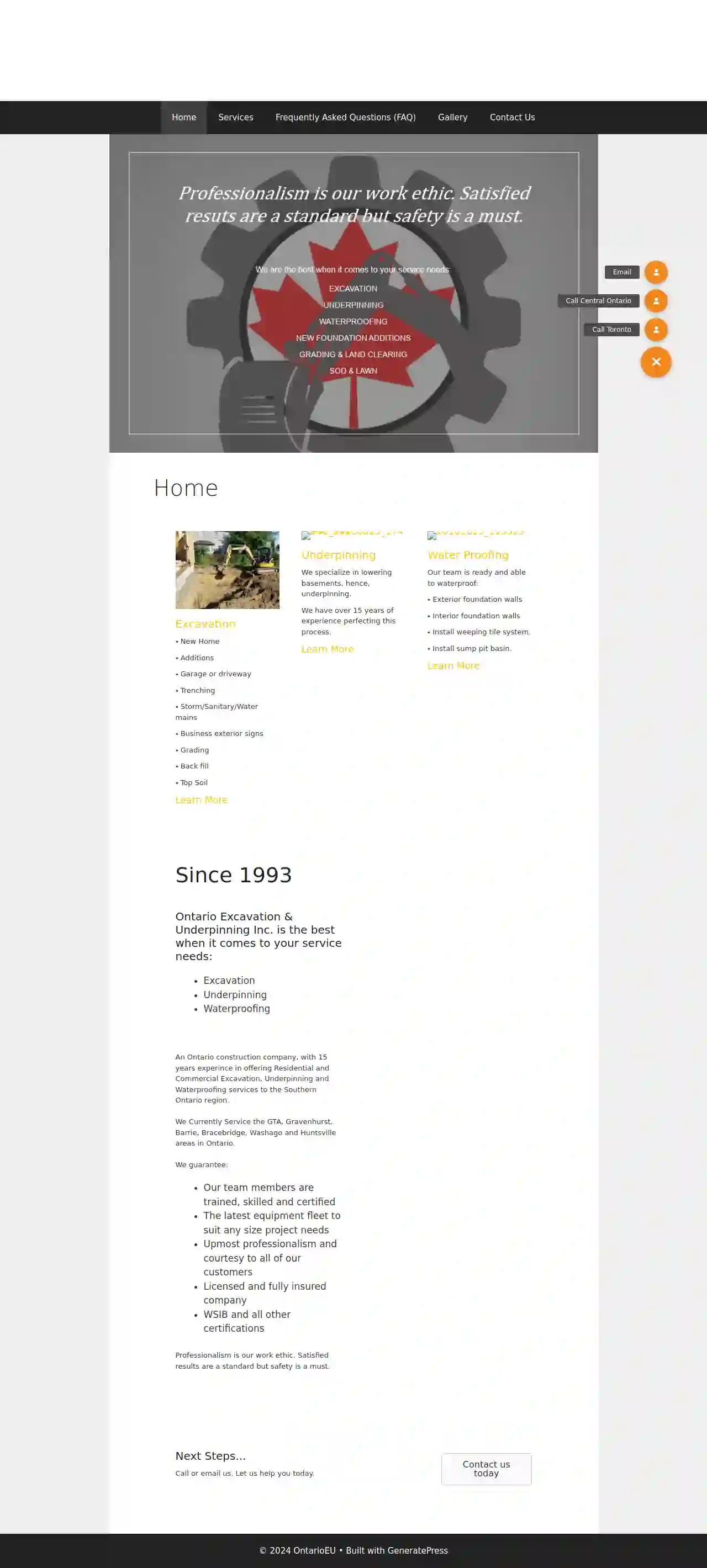Excavation Contractors Indio
Find Trenching Services in Indio
Receive 3 FREE Excavating Contractor quotes for your project today! Compare profiles, reviews, accreditations, portfolio, etc... and choose the best offer.
- Ax
Axner Excavating Inc.
4.6288 reviewsCarmichael, US- Services
- Why Us?
Get Quote - Au
Austreim Excavating
55 reviewsOakland, US- Services
- Why Us?
Get Quote 
Ortega's Grading
52 reviewsVictorville, US- Services
- Why Us?
Get Quote
Diamond Ridge Construction, LLC
51 reviews15161 Obenhoff Rd, Atlantic Mine, 49905, USDiamond Ridge Construction, llc Building your Dream Together At DRC-usa, our goal is to make our customers smile. We set out in 2016 to create a goal of improving the customer experience. We have been exceeding their expectations ever since. From Farmhouse design to contemporary to modern we would love to assist on your next project together. Diamond Ridge Construction has been serving the Houghton County area since 2016. Founded by Tyler and Johanna, husband and wife duo, Diamond Ridge Construction was formerly known as JTEK Service Pros. After a rebrand and new company direction, we decided to move into the business of consulting, construction and excavation site work. Our team is dedicated to providing high-quality craftsmanship and exceptional customer service. We are committed to working with you every step of the way to ensure your project is completed to your satisfaction. Call or email us to book an appointment today!
- Services
- Why Us?
- Our Team
- Gallery
Get Quote- Qu
Quality Excavation
51 reviewsFresno, US- Services
- Why Us?
Get Quote 
GOODENOUGH UNDERGROUND INC.
57 reviewsBonny Doon, USGOODENOUGH UNDERGROUND IS BASED IN BONNY DOON, SANTA CRUZ , CALIFORNIA. PROUD TO BE PROVIDING QUALITY EXCAVATION AND SEPTIC INSTALLATION SERVICES SINCE 2003 FOR SANTA CRUZ COUNTY. SPECIALIZING IN GRADING, EXCAVATION, COMPACTION, PIER DRILLING, UNDERGROUND UTILITY INSTALLATION, DRAINAGE SYSTEMS, NEW HOME SITE DEVELOPEMENT, AND SEPTIC SYSTEM INSTALLATIONS.
- Services
- Why Us?
- Our Team
- Gallery
Get Quote
Ontario Excavation & Underpinning
4.933 reviewsOntario, USOntario Excavation & Underpinning Inc. An Ontario construction company, with 15 years experience in offering Residential and Commercial Excavation, Underpinning and Waterproofing services to the Southern Ontario region. We Currently Service the GTA, Gravenhurst, Barrie, Bracebridge, Washago and Huntsville areas in Ontario. We guarantee: Our team members are trained, skilled and certified The latest equipment fleet to suit any size project needs Upmost professionalism and courtesy to all of our customers Licensed and fully insured company WSIB and all other certifications Professionalism is our work ethic. Satisfied results are a standard but safety is a must.
- Services
- Why Us?
- Gallery
Get Quote- Us
Usa perfect concrete
54 reviewsDavis, US- Services
- Why Us?
Get Quote - Ni
Nibbi Brothers General Contractors
4.318 reviewsBrentwood, US- Services
- Why Us?
Get Quote - Ma
Martinez Dozer Services, LLC
51 reviewsSalinas, US- Services
- Why Us?
Get Quote
Over 21,512+ Excavation Pros registered
Our excavation contractors operate in Indio and surroundings!
ExcavationHQ has curated and vetted the Best Excavation Pros near Indio. Find a trustworthy contractor today.
Frequently Asked Questions About Excavation Contractors
- Trench Collapses: Unstable trench walls can cave in, posing a severe risk to workers. Proper shoring and sloping are crucial safety measures.
- Utility Damage: Striking underground utilities (gas, water, electric) can cause leaks, explosions, or electrocution. Accurate utility locates and careful digging are essential.
- Falling Objects: Materials or equipment falling into excavations can injure workers. Securing work areas and using appropriate safety gear is vital.
- Equipment Accidents: Operating heavy machinery involves risks of rollovers, collisions, or mechanical failures. Trained operators and proper equipment maintenance are critical.
- Environmental Hazards: Excavated soil might contain hazardous materials (asbestos, lead). Proper testing and disposal procedures are necessary.
- Basement Size: The larger the basement, the more excavation is required, increasing the cost.
- Soil Type: Excavating rocky or dense clay soil is generally more expensive than loose soil.
- Accessibility: Difficult-to-access sites might require specialized equipment or more labor, driving up costs.
- Foundation Type: The chosen foundation type (full basement, crawl space, slab) affects excavation needs.
- Underpinning: If underpinning (strengthening existing foundations) is necessary, it significantly increases costs.
- Disposal Fees: Hauling excavated soil to disposal sites adds to the overall expense.
- Project Size and Scope: The larger and more complex the excavation, the higher the cost.
- Soil Type: Different soil types require different equipment and techniques, impacting costs. Rocky or clay-rich soil can be more expensive to excavate than loose soil.
- Accessibility: Difficult-to-access sites might require specialized equipment or additional labor, increasing expenses.
- Disposal Costs: Hauling away excavated material (soil, rocks, etc.) to disposal sites incurs additional fees.
- Permits and Inspections: Depending on local regulations, permits and inspections might be required, adding to the overall cost.
- Mechanical Excavation: Utilizing heavy equipment like excavators, backhoes, bulldozers, and loaders, suitable for most projects.
- Hand Excavation: Using hand tools (shovels, picks) for smaller excavations or delicate work near utilities.
- Blasting: Employing explosives to break up rock or hard materials, typically for large-scale projects.
- Hydro Excavation: Using high-pressure water jets to loosen and remove soil, often used for locating utilities or delicate excavation.
- Vacuum Excavation: Employing a vacuum system to suck up excavated material, suitable for safe excavation near utilities or in confined spaces.
What are the risks associated with excavation?
How much does it cost to excavate a basement?
How much does excavation cost?
What are the different methods of excavation?
What are the risks associated with excavation?
- Trench Collapses: Unstable trench walls can cave in, posing a severe risk to workers. Proper shoring and sloping are crucial safety measures.
- Utility Damage: Striking underground utilities (gas, water, electric) can cause leaks, explosions, or electrocution. Accurate utility locates and careful digging are essential.
- Falling Objects: Materials or equipment falling into excavations can injure workers. Securing work areas and using appropriate safety gear is vital.
- Equipment Accidents: Operating heavy machinery involves risks of rollovers, collisions, or mechanical failures. Trained operators and proper equipment maintenance are critical.
- Environmental Hazards: Excavated soil might contain hazardous materials (asbestos, lead). Proper testing and disposal procedures are necessary.
How much does it cost to excavate a basement?
- Basement Size: The larger the basement, the more excavation is required, increasing the cost.
- Soil Type: Excavating rocky or dense clay soil is generally more expensive than loose soil.
- Accessibility: Difficult-to-access sites might require specialized equipment or more labor, driving up costs.
- Foundation Type: The chosen foundation type (full basement, crawl space, slab) affects excavation needs.
- Underpinning: If underpinning (strengthening existing foundations) is necessary, it significantly increases costs.
- Disposal Fees: Hauling excavated soil to disposal sites adds to the overall expense.
How much does excavation cost?
- Project Size and Scope: The larger and more complex the excavation, the higher the cost.
- Soil Type: Different soil types require different equipment and techniques, impacting costs. Rocky or clay-rich soil can be more expensive to excavate than loose soil.
- Accessibility: Difficult-to-access sites might require specialized equipment or additional labor, increasing expenses.
- Disposal Costs: Hauling away excavated material (soil, rocks, etc.) to disposal sites incurs additional fees.
- Permits and Inspections: Depending on local regulations, permits and inspections might be required, adding to the overall cost.
What are the different methods of excavation?
- Mechanical Excavation: Utilizing heavy equipment like excavators, backhoes, bulldozers, and loaders, suitable for most projects.
- Hand Excavation: Using hand tools (shovels, picks) for smaller excavations or delicate work near utilities.
- Blasting: Employing explosives to break up rock or hard materials, typically for large-scale projects.
- Hydro Excavation: Using high-pressure water jets to loosen and remove soil, often used for locating utilities or delicate excavation.
- Vacuum Excavation: Employing a vacuum system to suck up excavated material, suitable for safe excavation near utilities or in confined spaces.